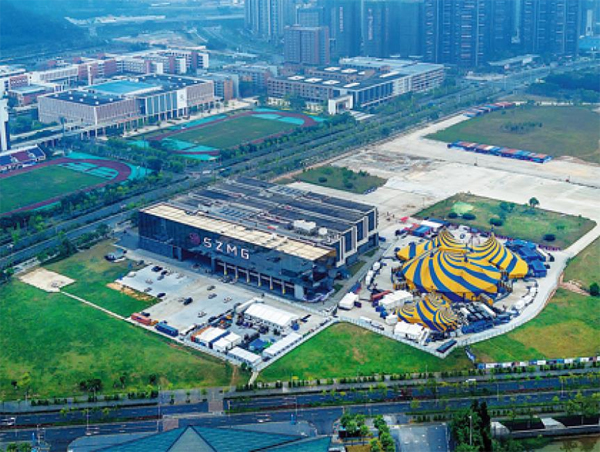Visual effects teams flocking to fresh location

A bird's-eye view of the Shenzhen-Hong Kong international postproduction base in Longgang, Shenzhen, Guangdong province. [Photo by Liang Xiashun/For China Daily]
Greater Bay Area offers new opportunities, competitive advantages
Increasing numbers of visual effects artists are heading to the Guangdong-Hong Kong-Macao Greater Bay Area, eyeing the region's competitiveness in filmmaking technologies and facilities, policy support and market scale.
Hailing from Beijing, Shanghai and foreign countries, the artists are using southern China as a springboard to search for work in the nation's vast film industry.
The Greater Bay Area is also home to leading film and entertainment companies expanding their operations, veteran actors pursuing career development as well as multiple shooting locations and facilities. The area also enjoys abundant policy support for the film and television industry.
Guangdong province, which boasts about 600 movie and TV companies and the most cinema screens in the nation, has been China's largest film market in terms of box office takings since 2001.
With new developments in investment, film shooting, production and promotion work, it is hoped that a full industry chain can be established in the region.
Industry figures also expect the region to become China's answer to the Canadian city of Vancouver-the "production backyard" for Hollywood-and a movie production hub to rival Beijing and the Yangtze River Delta.
Since 2008, the Chinese film industry has witnessed rapid development, with box office takings rising by 35 percent on average each year, reaching 64 billion yuan in 2019.
With increased investment and technological advances, visual effects have become a key selling point, and ever-increasing science fiction and animation films featuring this technology, including Monster Hunt, The Wandering Earth and Ne Zha, have achieved great success and top place at the box office.
Buoyed by this thriving market, Nie Huajun, a veteran TV visual effects artist based in Beijing, arrived in Shenzhen, Guangdong, in 2007. He founded the company LOCATOR VFX in 2017 to produce movie visual effects with a group of friends returning from overseas.
Nie said that in the past three to five years, more people have taken a similar path to explore opportunities in the Greater Bay Area. Several teams from South Korea, Beijing and Hong Kong-all leading locations in the industry-have successively started operating in Shenzhen.
The Shenzhen-Hong Kong international postproduction base in Longgang, which was set up this year, has attracted more than a dozen teams, and this figure is expected to rise to 30 after completion of its second phase, according to Nie, who helped launch the base.
New visual effects companies have also sprung up in other cities in the Greater Bay Area, such as Guangzhou, Jiangmen and Foshan in Guangdong, Nie said, adding that the region has about 30 such companies.
He is not surprised by the latest developments in Shenzhen, as since the beginning of this century, the city has been one of the birthplaces on the Chinese mainland for visual effects, benefiting from being close geographically to Hong Kong, an international film production hub.
At the time, Hong Kong had developed a relatively mature visual effects industry, producing a series of eye-catching blockbusters such as Shaolin Soccer and Kung Fu Hustle.
To expand the market, Hong Kong collaborated with the mainland to produce Storm Rider Clash of the Evils, a martial arts animation film based on the city's smash-hit comic series Fung Wan in the 1990s.
With collective expertise, the movie, which took five years to produce and was released in 2008, made about 33 million yuan at the box office and broke many domestic animation film records. However, it failed to make a profit, as it cost 70 million yuan to make.
A company with a 70-strong cross-regional team was established in Shenzhen around 2007 to produce visual effects for the movie. The team, which included Nie among the nation's leading talent in this field, came from Hong Kong, Shanghai and Beijing.



 Print
Print Mail
Mail

